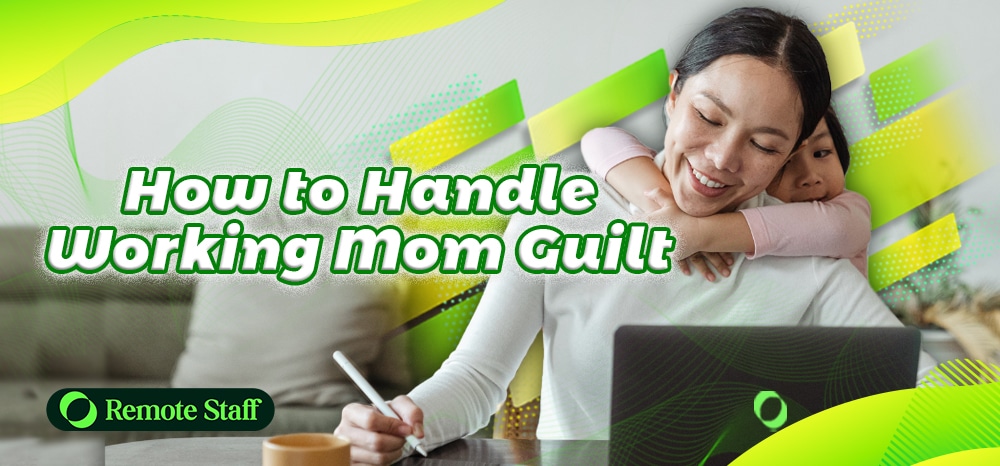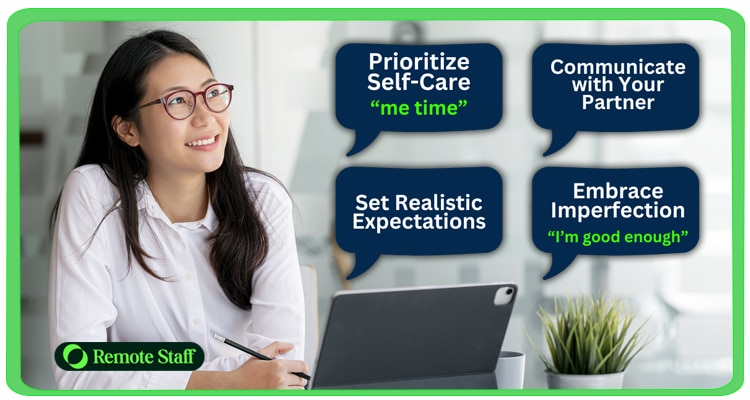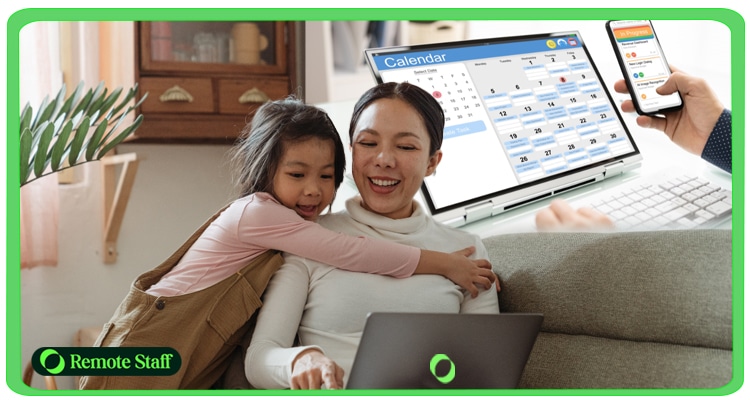Mom guilt is something many mothers feel as they balance raising kids, managing the home, and working on personal or professional goals.
It often comes from worrying you’re not doing enough or are constantly missing something.
It’s perfectly normal to feel this way, so it’s important to remind yourself that you’re doing the best you can.
However, when guilt starts to feel a little too heavy, it’s important to handle it in a healthy way. Here are some tips to manage those feelings so they don’t get in the way of you living your best life:
Understanding Mom Guilt: Why It Happens
Mom guilt often comes from trying to be perfect in every part of life—whether as a mom, a wife, or a professional.
Society’s expectations and comparing yourself to others can make you feel like you’re not doing enough, among other things:
Common triggers of mom guilt.
Identifying the triggers behind mom guilt is the first step toward managing it. Let’s explore some of the most common ones:
Lack of Time for Yourself
Feeling guilty for taking time for self-care or personal hobbies can be a major trigger, especially when you worry about not spending enough time with your family as it is.
Balancing Work and Family
If you’re a working mom, guilt can arise from not being able to give equal attention to both your job and your children.
Comparison to Other Moms
Social media and parenting groups often post their highlights without showing the messy behind-the-scenes of what it really means to raise a family, which can make you feel like you’re falling short in comparison.
Not Meeting Your Own Expectations
High personal standards can lead to guilt when you feel you’re not living up to your own ideal of what a mother should be.
Delegating Tasks to Helpers
Whether it’s hiring help with running the household or relying on daycare, some moms feel guilty about not handling everything on their own.
Feeling Like You’re Not Enough
The belief that you can’t be everything to everyone (even if you don’t need to be), or that you’re missing out on moments with your children, can further fuel mom guilt.
Societal Pressures, Social Media, and Unrealistic Expectations
External factors like societal pressures, social media, and unrealistic expectations often intensify mom guilt, creating an impossible standard for what it means to be a good (i.e., “perfect”) mom.
Emotional Impact on Mothers and the Importance of Self-Compassion
Striving to meet unrealistic expectations can be mentally exhausting.
Practicing self-compassion helps ease these feelings by allowing you to accept imperfection and focus on your well-being. Being kind to yourself also improves your emotional health and helps you be more present with your family.
Moreover, you can also use the strategies in the next section to reduce guilt and build a healthier mindset, helping you thrive as a mother with more confidence.
Strategies to Overcome Mom Guilt
Dealing with mom guilt isn’t easy, but it’s doable. These strategies will help you shift your mindset, let go of unnecessary guilt, and embrace motherhood with more confidence.
Prioritize Self-Care: The significance of “me time” and practical ways to fit it into a busy schedule.
Taking care of yourself isn’t selfish—it helps you be a better mom.
Prioritizing self-care allows you to recharge physically and mentally, reduce stress, and prevent burnout, so you can be more patient and present for your child.
Even small moments of “me time” can boost your energy and well-being.
Here are simple ways to fit self-care into your day:
- Take Small Breaks: Just 10–15 minutes of quiet time, reading, or stretching can help.
- Plan It: Set time for activities that make you happy, just like any other important task.
- Ask for Help: Let your partner, family, or friends watch the kids while you take a break.
- Find Pockets of Joy in Everyday Moments: Take time to appreciate small moments— like sharing a laugh with your child, feeling the warmth of the sun, or savoring your favorite snack—to recharge and stay present.
For example, if you’re juggling WFH jobs while caring for your kids, taking short breaks between tasks can help you reset. A 10-minute walk, a cup of coffee in peace, or a quick meditation session can make a big difference in your mood and focus.
Making self-care a habit will help you find a healthier balance and empower you to handle daily life better.
Embrace Imperfection: Understanding that “good enough” parenting is often the best approach.
Trying to be a “perfect mom” can be exhausting. The truth is, being “good enough” is often the best approach.
Focusing on love, effort, and your child’s well-being helps you build a healthier, more fulfilling relationship with your children and yourself, especially when balancing motherhood with other responsibilities.
Here’s how to let go of unrealistic expectations:
- Accept Mistakes: No parent is perfect, and that’s okay.
- Focus on What Matters: Love, connection, and your child’s happiness come first.
- Avoid Comparisons: Every family is different, so do what works for you and your child.
- Celebrate Small Wins: Take a moment to acknowledge what you’re already doing well.
For example, as a mom with WFH jobs, you may feel bad if dinner isn’t homemade or if you skip some of your kid’s activities. However, knowing that you’re doing the best you can is all that matters.
By embracing imperfection, you’ll feel less stressed and enjoy motherhood more.
Communicate with Your Partner: Building a supportive household dynamic.
Open communication with your partner is key to managing the challenges of parenting, especially when both of you are balancing a professional career, WFH jobs, and household responsibilities.
By working together and sharing the load, you can create a supportive environment that eases stress and strengthens your relationship.
Here’s how to communicate effectively:
- Be Honest About Your Needs: Be crystal clear about what you need in terms of help, time for yourself, or emotional support.
- Set Clear Expectations: Discuss roles and responsibilities, whether it’s childcare, household chores, or work tasks.
- Check in With Each Other Regularly: Have regular conversations to adjust and support each other as circumstances change.
- Acknowledge Each Other’s Efforts: Celebrate the small wins together, and express appreciation for the work that both of you do.
By communicating openly, you’ll feel more supported and less overwhelmed, creating a more balanced and harmonious home life.
Set Realistic Expectations: Balancing ambitions with achievable goals in parenting.
Parenting can feel overwhelming, especially when you’re trying to do it all. Setting realistic expectations helps you balance your goals and reduce stress.
Here’s how to set achievable expectations:
- Prioritize: Focus on what’s most important and let go of extra pressure.
- Be Flexible: Adjust your plans as needed—parenthood is unpredictable.
- Know Your Limits: Accept that you can’t do everything, and that’s okay.
- Celebrate Progress: Recognize and appreciate small victories.
For example, as a mom balancing WFH jobs, you might feel guilty when you can’t attend every school event. However, setting realistic expectations and accepting that you can’t be everywhere at once helps you keep things in perspective.
By setting achievable goals, you can enjoy parenting and feel more balanced overall.
Building a Positive Mindset Amidst Challenges
Building a positive mindset, especially as a mom balancing work and family duties, helps you handle moments of guilt and stress more easily.
Here are some positivity tips to stay optimistic while managing both motherhood and work.
Cultivating gratitude: The power of journaling and affirmations.
Cultivating gratitude can be a powerful tool for building a positive mindset.
Taking time to journal about what you’re thankful for or using affirmations can help shift your focus from stress to appreciation, boosting your emotional well-being.
By practicing gratitude regularly, you create a more positive perspective, even during challenging times.
Check these links on tips on how to take advantage of journaling and how to effectively create affirmations.
Mindfulness practices tailored for busy moms.
Mindfulness practices can help busy moms stay grounded and present, reducing stress and enhancing emotional well-being:
- Deep Breathing: Take a few minutes to focus on your breath, inhaling deeply and exhaling slowly to calm your mind.
- Body Scan: A body scan is a mindfulness practice where you focus on each part of your body, from head to toe, noticing any tension or discomfort.
By paying attention to these areas and consciously relaxing them, you can reduce stress and feel more relaxed. It’s a simple way to calm your mind and body.
- Mindful Walking: When you have a few minutes, go for a walk and pay attention to the sights, sounds, and feelings around you.
- Gratitude Pause: Take a moment each day to reflect on three things you’re grateful for.
- Mindful Eating: Slow down and savor each bite of your meals, paying attention to the taste and texture of your food.
These small practices can help you stay focused and connected to the present moment, even on your busiest days.
Engaging in hobbies and creative outlets for mental rejuvenation.
Engaging in hobbies and creative outlets is a great way to refresh your mind and boost your mood.
Whether it’s painting, gardening, or knitting, taking time for these activities helps you disconnect from daily stress, allowing you to recharge mentally and emotionally.
It’s a form of self-care that boosts positivity while nurturing your creativity and well-being.
Surrounding yourself with a supportive community or mom groups.
Being part of a supportive community or mom group helps you feel connected and understood.
Sharing experiences with others who face similar challenges reduces isolation and reminds you that you’re not alone.
However, though these groups offer support and advice, remember, every family’s journey is different, and it’s okay to go at your own pace.
Don’t feel pressured to meet others’ expectations or compare your parenting. Focus on what works for you and take only what’s helpful.
Balancing Work and Motherhood Without Guilt
Here are some ways to manage both effectively, without the guilt that tends to accompany either, while prioritizing your well-being in the process.
Time Management Tips: Effective scheduling and prioritization techniques.
Effective time management is your ally. Here are some tips to deploy it better:
- Use a Planner: A planner or digital calendar can help you track appointments, tasks, and family activities in one place.
- Set Priorities: Identify your most important tasks each day and focus on completing those first.
- Break Tasks into Smaller Steps: Breaking larger tasks down into smaller, manageable steps makes them less overwhelming and more achievable.
- Schedule Family Time: Block out time specifically for your family, just as you would for work-related activities, to ensure you nurture those connections.
- Set Boundaries: Set clear work hours so you can be present with family outside these.
These strategies help you stay organized so you can manage both work and home life more easily.
Delegation Skills: Know when and how to ask for help.
Know when to ask for help. Delegate tasks to lighten your load and focus on what matters most.
At work, delegate tasks to others when possible so you can focus on more important duties. If you don’t have subordinates, use AI tools to automate tasks, organize your schedule, and help with research to save time and reduce stress.
At home, ask your partner or family for help with chores or childcare when you’re feeling overwhelmed. Be clear and specific about what needs to be done to lighten your load and get the support you need.
By recognizing when you need help and being willing to ask for it, you create a more manageable balance between your work and family commitments.
Setting Boundaries: Clear work-life distinctions to ensure quality family time.
Create clear distinctions between work and family time to prioritize both your professional responsibilities and moments with your loved ones:
- Create a Dedicated Workspace: If possible, set up a separate work area in another room to help you mentally separate work from home life.
- Communicate with Family: Clearly communicate your work hours so your family knows when you’re available – and when you shouldn’t be disturbed.
- Set Technology Limits: Avoid checking work emails or taking calls during family time. Turn off work notifications outside of your set hours.
By setting boundaries, you can focus fully on work during office hours and be present with your family outside of these.
Bonus Section: Flexible Work-from-Home Jobs for Moms
Consider flexible work-from-home jobs that allow you to work around a schedule that works for you, enabling you to focus on both your career and your family life without guilt.
Here are some work-from-home jobs for moms:
- Call Center Agent: Customer service support from home.
- Online Survey Taker: Earning extra income by sharing opinions.
- Virtual Receptionist: Handling client calls and appointments remotely.
- Proofreader or Editor: Polishing content for writers and publishers.
- Translator: Converting documents into different languages.
- Virtual Travel Agent: Helping clients plan vacations.
- Online Moderator: Monitoring discussions on forums or social media platforms.
- Email Support Specialist: Responding to customer queries efficiently.
- Online Researcher: Supporting academic or business needs with curated information.
- Virtual Personal Assistant: Managing schedules, emails, and more for busy professionals.
Tips for avoiding scams and finding reputable WFH opportunities.
While WFH jobs provide flexibility for moms, staying cautious is key to avoiding scams. Here’s how to find legitimate opportunities:
- Research the Company: Check reviews, websites, and social media to verify legitimacy.
- Beware of Upfront Fees: Legitimate work online won’t ask you to pay to apply or start working.
- Look for Clear Job Details: Scams often have vague descriptions and unrealistic pay.
- Verify Contact Information: A real company will have a professional email, website, and social presence.
You can also apply with trusted outsourcing agencies like Remote Staff to find opportunities, especially if you’re just starting out.
Furthermore, you can check these common WFH scams and red flags to protect yourself from fraudulent opportunities.
Inspiring Stories: How Real Moms Handle Guilt Positively
Mom guilt can be tough, but these real stories from an article by Familist show how Filipina moms embrace imperfection, prioritize self-care, and maintain a positive mindset while balancing their responsibilities.
For instance, Janna Simpao, a mom and entrepreneur, often feels guilty when she takes time to rest.
Despite this, she reminds herself that rest is essential for recharging, which helps her be more present for her family and work.
As she puts it, “The guilt might not fully go away, but I end up realizing the time of rest was needed because it recharged me afterwards to give more to everyone around me.”
Similarly, Dareen Donan, a mom of two, shares her struggle with feeling guilty when she can’t manage both her five-year-old and one-month-old at the same time.
To cope, she turns to her support system, including her husband and sister, and sets up a family schedule to ensure quality time for both children.
As she says, “Guilty? I think it would always happen anytime with many reasons–what’s important is that you have your vent buddy or buddies that are ready to back you up.”
Another example is Jane Aguirre, a working mom, who sometimes feels guilty about balancing work and family. To manage this, she creates a schedule that includes family time and explains to her daughter that work makes her happy, just like her daughter enjoys school and activities.
If she has weekend work, she brings her daughter along and they bond afterward.
These stories show how moms embrace imperfections and balance their responsibilities by seeking support, setting expectations, and taking time to rest.
They remind us that it’s okay to ask for help, prioritize self-care, and find balance in the demands of motherhood.
 FAQs on Managing Mom Guilt and Staying Positive
FAQs on Managing Mom Guilt and Staying Positive
You may have some more questions, so here are a few answers to help.
What is mom guilt, and how do I know if I have it?
Mom guilt is the feeling that you’re not doing enough for your kids or family.
You might experience it if you feel overwhelmed, compare yourself to others, or feel guilty about balancing work or self-care with parenting.
Are work-from-home jobs really flexible for moms?
Yes, work-from-home jobs can offer flexibility for moms, allowing you to work around your family’s needs.
However, the level of flexibility depends on the job and employer. So it’s important to find opportunities that align with your personal schedule.
How do I overcome the guilt of needing “me time”?
Remember, taking breaks isn’t selfish—it helps you recharge emotionally and physically.
When you care for yourself, you’re better equipped to support and be present for your family.
Conclusion
In conclusion, mom guilt is common when balancing parenting, work, and personal goals. It’s normal to feel like you’re not doing enough, but remember, you’re doing the best you can.
When guilt feels heavy, use the tips above to manage it, reduce stress, and focus on what matters most—your family and well-being.
Also, if you’re considering remote work, remember that flexible jobs can help ease the pressure by allowing you to create a schedule that works for you and your family.
You can sign up with Remote Staff to find reliable home based jobs in the Philippines that fit your lifestyle and help you balance work and family.
Embrace the journey, and remember, it’s okay to not have it all figured out.







 FAQs on Managing Mom Guilt and Staying Positive
FAQs on Managing Mom Guilt and Staying Positive